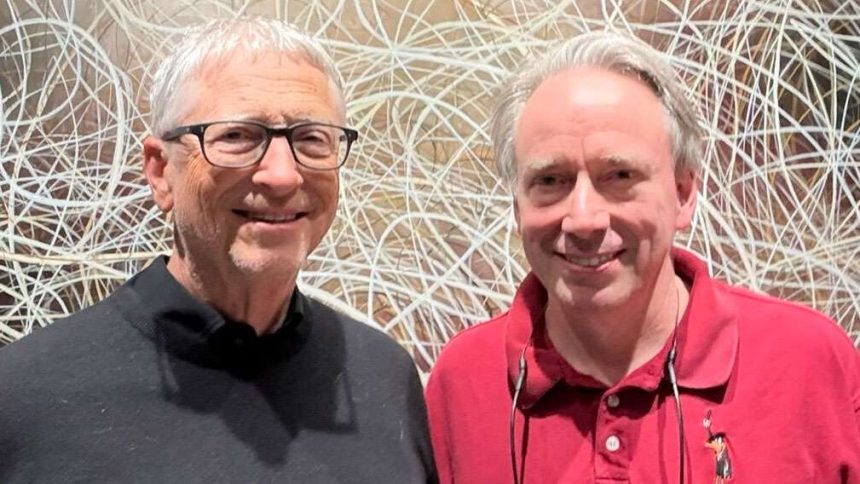For decades, they shaped the foundation of modern computing—one through proprietary software, the other through open-source ideals. Yet until now, Bill Gates, co-founder of Microsoft, and Linus Torvalds, creator of Linux, had never been publicly seen together in a social setting.
That changed recently when Mark Russinovich, Chief Technology Officer of Microsoft Azure, shared a photo on LinkedIn of himself dining with both Gates and Torvalds, alongside Microsoft veteran David Cutler, a legendary engineer behind Windows NT.
The image stirred the tech world, not for any announced collaboration, but for what it quietly represents: a rare, almost surreal moment of convergence between two vastly different computing philosophies.
A Dinner Decades in the Making
The photo has prompted interest not just because of who was present, but also because of who had never been. Despite their outsized roles in shaping the digital world, Gates and Torvalds have rarely intersected publicly, let alone been seen in casual conversation.
In the post, Russinovich noted that no major kernel decisions were made, underscoring the informal nature of the dinner. Still, the meeting captured widespread attention among developers, engineers, and tech historians.
The gathering may not have produced new software, but it marked something arguably more impactful: a symbolic thaw in one of the tech industry’s longest-standing ideological divides.
Bill Gates and Linus Torvalds have built their reputations on opposite ends of the software spectrum. Gates helped commercialize software through closed-source licensing and enterprise-scale innovation, turning Microsoft into one of the most profitable companies in the world. His model emphasized control, monetization, and platform dominance.
Torvalds, on the other hand, leads the open-source movement through his stewardship of the Linux kernel. Built collaboratively by thousands of developers worldwide, Linux is free to use, modify, and distribute.
It powers everything from smartphones and supercomputers to cloud servers and embedded devices. Torvalds’ approach is rooted in software freedom, decentralization, and merit-based contribution.
The contrast has often led to friction—culturally, commercially, and even comically. Torvalds has publicly critiqued Microsoft’s past practices and famously joked:
“Microsoft isn’t evil; they just make really crappy operating systems. PC is like air conditioning—it becomes useless when you open Windows.”
Microsoft’s Changing Role in Open Source
The meeting takes on greater significance in light of Microsoft’s evolving relationship with open-source technologies. Under Satya Nadella’s leadership, Microsoft has not only embraced open source but invested in it.
The company acquired GitHub, launched a Linux subsystem for Windows, and is now one of the largest corporate contributors to open-source repositories globally.
Microsoft Azure, in particular, has become a major platform for running Linux workloads.
According to the company, over half of Azure’s virtual machines run Linux—a statistic that would have seemed unthinkable during the Gates era. Russinovich himself is a key figure in Microsoft’s transition toward greater interoperability and open-source engagement.
This context makes the dinner more than just a photo opportunity—it’s a visual metaphor for an industry coming full circle.
Why This Matters for Developers and Startups
The symbolic unity of Gates and Torvalds sends a subtle but strong message: ideological purity is giving way to pragmatic collaboration.
In a world increasingly powered by APIs, cloud-native stacks, and hybrid infrastructures, the future of software isn’t about choosing between open or closed—it’s about what works together.
For developers in emerging markets like Nigeria, where open-source adoption is driven by necessity and innovation, this meeting underscores an important shift. The foundational tools of the future—whether AI models, cloud deployments, or mobile frameworks—will be shaped not by rivalry, but by interoperability.
Startups can take inspiration from both worlds: the scalability and distribution power of Microsoft, and the accessibility and community-driven ethos of Linux. In the end, both perspectives are needed to solve complex, global problems.
Talking Points
No major product announcement followed this dinner. No collaborative framework emerged. But perhaps none was needed.
The fact that Gates and Torvalds could sit at the same table, after decades of shaping tech in very different ways, suggests that coexistence has replaced conflict in a rapidly evolving software world.
And for once, the quiet symbolism may be louder than any keynote.





